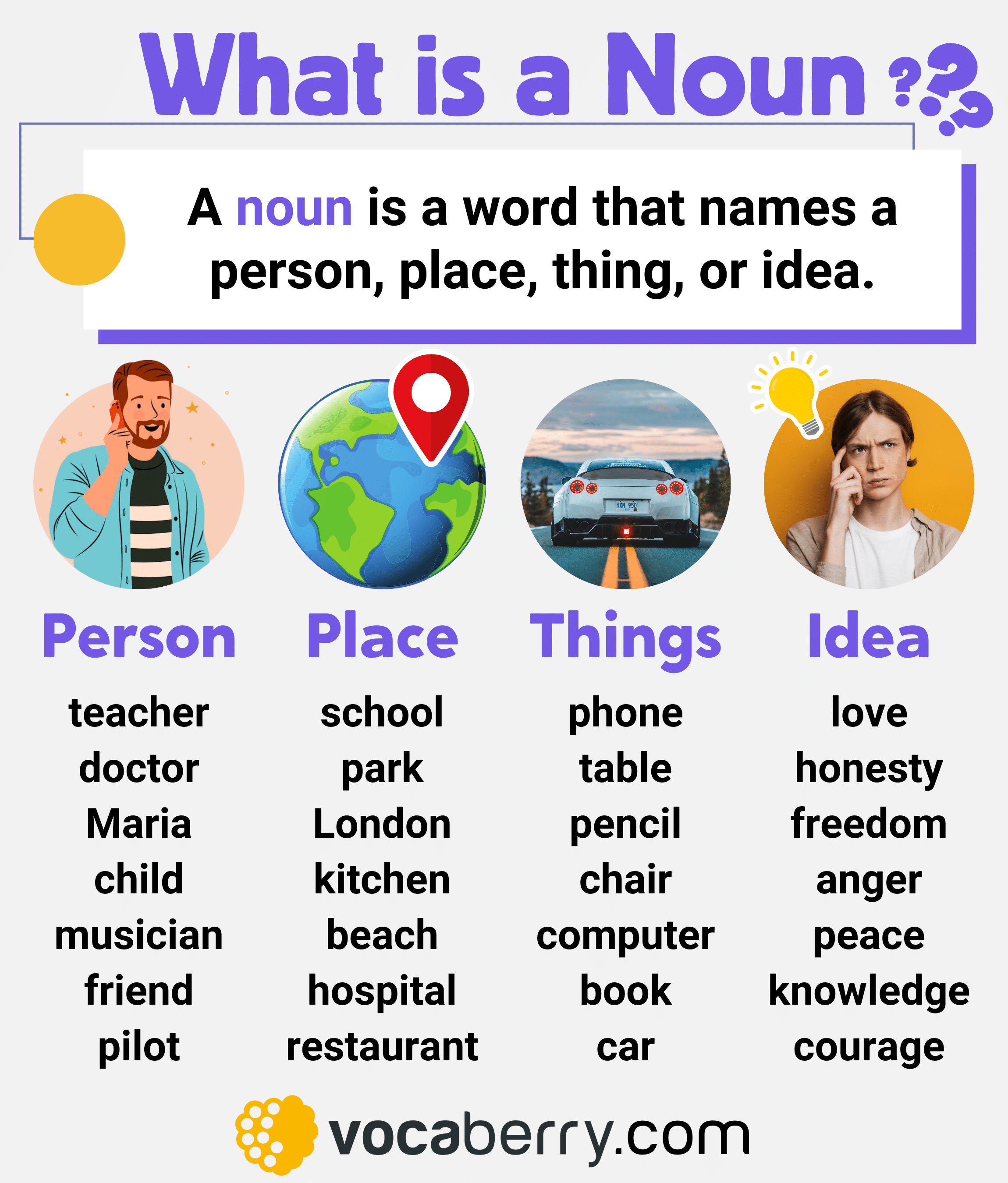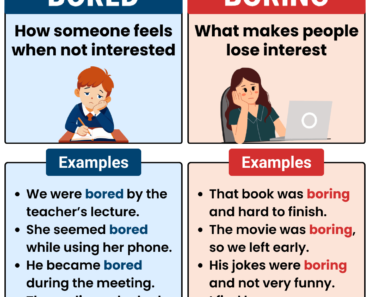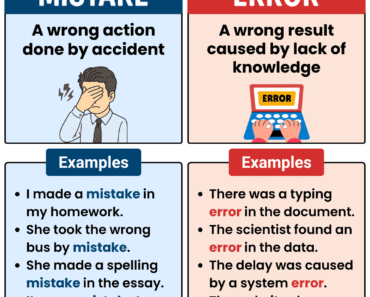
Nouns are the foundation of English sentences, allowing us to name people, places, things, ideas, and emotions. Without nouns, communication would be incomplete, making it difficult to describe objects, express thoughts, or talk about experiences. Understanding nouns is essential for building clear and meaningful sentences, whether you’re writing, speaking, or learning English.
This comprehensive guide will explain what nouns are, their different types, how they function in sentences, and essential grammar rules. You’ll also learn about singular and plural forms, countable and uncountable nouns, possessive structures, noun phrases, and capitalization rules. By the end of this article, you’ll have a strong understanding of nouns, helping you improve your grammar, sentence structure, and overall English fluency.
What Is a Noun?
A noun is a word that represents a person, place, thing, or idea. It is the main subject of a sentence and answers “What?” or “Who?”
Examples of Nouns in Sentences:
- People: The doctor helped the patient.
- Places: We visited a museum in Paris.
- Things: I bought a new computer.
- Ideas: Happiness is the key to success.
Every English sentence contains at least one noun. Without nouns, sentences wouldn’t make sense.
Types of Nouns in English
There are many different types of nouns, each serving a unique function in English. Understanding these categories helps in proper sentence formation and avoiding grammatical errors.
1. Common and Proper Nouns
Common Nouns
A common noun is a general name for a person, place, or thing.
Examples:
- Person: teacher, writer, student
- Place: city, beach, school
- Thing: book, chair, phone
Proper Nouns
A proper noun refers to a specific name of a person, place, or thing. It always starts with a capital letter.
- Person: Albert Einstein, William Shakespeare
- Place: New York, Tokyo, Eiffel Tower
- Thing: Coca-Cola, Google, Titanic
Examples:
- Common: I live in a city.
- Proper: I live in New York.
2. Countable and Uncountable Nouns
Countable Nouns
These nouns can be counted and have both singular and plural forms, such as apples, chairs, books, and dogs.
Examples:
- I have two apples.
- There are many books on the table.
Uncountable Nouns
These nouns cannot be counted individually and do not have a plural form, such as water, sugar, rice, and happiness.
Examples:
- I need some water to drink.
- Her happiness is important.
Grammar Rule:
Correct: I have some water.
Incorrect: I have two waters.
3. Concrete and Abstract Nouns
Concrete Nouns
These nouns can be perceived through the senses. They can be seen, touched, heard, smelled, or tasted, such as table, dog, music, and apple.
Examples:
- The dog is barking.
- I bought a new phone.
Abstract Nouns
These nouns represent ideas, emotions, or qualities that cannot be physically touched, such as love, friendship, bravery, and happiness.
Examples:
- Love is important in life.
- His bravery saved the day.
4. Collective Nouns
A collective noun is a word for a group of people, animals, or things.
Examples:
- A team of players
- A flock of birds
- A family of four
5. Compound Nouns
A compound noun is formed by joining two or more words together.
Types of Compound Nouns:
- Open form: ice cream, living room
- Hyphenated form: mother-in-law, six-pack
- Closed form: toothpaste, notebook
Examples:
- I bought a toothbrush and toothpaste.
- My father-in-law is visiting us next weekend.
- He packed his notebook for the meeting.
- She placed the books on the coffee table.
6. Possessive Nouns
A possessive noun shows ownership or possession.
| Singular Possessive | Plural Possessive |
|---|---|
| The boy’s hat | The boys’ hats |
| My dog’s bone | My dogs’ bones |
Examples:
- That is John’s car.
- The students’ books are on the table.
Singular and Plural Nouns
Most nouns form their plural by adding “-s” or “-es”.
| Singular | Plural |
|---|---|
| car | cars |
| bus | buses |
| baby | babies |
Some nouns have irregular plural forms that do not follow the standard rules of adding ‘-s’ or ‘-es’. Instead, their spelling changes completely or follows unique patterns.
| Singular | Plural |
|---|---|
| man | men |
| child | children |
| foot | feet |
Functions of Nouns in a Sentence
Nouns can play different roles or functions in a sentence. Understanding these will help you form better, clearer sentences in English.
1. Subject
The noun is the doer of the action or what the sentence is about.
-
Emma loves dancing.
-
The book is on the table.
2. Direct Object
The noun receives the action of the verb.
-
She baked a cake.
-
I saw a movie last night.
3. Indirect Object
The noun receives the benefit of the action.
-
He gave his friend a gift.
-
I told her the truth.
4. Object of a Preposition
The noun comes after a preposition in a phrase.
-
The keys are on the table.
-
She walked to the park.
5. Subject Complement
The noun renames or describes the subject (used with linking verbs like be).
-
My father is a doctor.
-
That man is a teacher.
6. Object Complement
The noun renames the direct object or gives more information about it.
-
They elected him president.
-
We named the dog Max.
Gerunds as Nouns
A gerund is the -ing form of a verb that functions as a noun in a sentence. Even though it looks like a verb, it acts like a noun and can be the subject, object, or complement in a sentence.
Gerunds are always formed by adding -ing to the base form of a verb, such as reading, swimming, cooking, and running.
Uses of Gerunds as Nouns:
1. Gerunds as the Subject of a Sentence: The gerund comes at the beginning and acts as the main subject.
-
Reading is my favorite hobby.
-
Swimming is good for your health.
2. Gerunds as the Object of a Verb: The gerund follows a verb and works as the object.
-
I enjoy traveling.
-
She hates waiting in long lines.
3. Gerunds as the Object of a Preposition: The gerund comes after a preposition and acts like a noun.
-
He is good at drawing.
-
They talked about moving to another city.
4. Gerunds as a Subject Complement: The gerund gives more information about the subject.
-
Her favorite activity is jogging.
-
His passion is writing.
Common Verbs Followed by Gerunds:
Some verbs are usually followed by gerunds rather than infinitives.
Examples:
-
enjoy: I enjoy listening to music.
-
avoid: She avoids eating junk food.
-
suggest: He suggested meeting earlier.
-
mind: Do you mind closing the window?
Noun Modifiers – When One Noun Describes Another
In English, a noun can be used to modify (describe) another noun. This type of noun acts like an adjective, giving more information about the following noun. These are called noun modifiers or attributive nouns.
They usually answer questions like:
What kind? What type? What purpose? What material?
Structure:
[Modifier Noun] + [Main Noun]
The first noun describes the second noun. Together, they form a compound noun phrase.
Common Examples:
-
chicken soup → (What kind of soup? → Chicken)
-
car engine → (What kind of engine? → Car)
-
school bus → (What kind of bus? → School)
-
glass bottle → (What kind of bottle? → Glass)
-
coffee cup → (What kind of cup? → Coffee)
Notes:
1. Noun modifiers are always singular, even when the meaning is plural:
Correct: I bought a shoe store gift card for my friend.
Incorrect: I bought a shoes store gift card for my friend.
Correct: She designed a new book cover for her novel.
Incorrect: She designed a new books cover for her novel.
2. The main noun takes the plural form, not the modifier.
Correct: The mechanic fixed several car engines today.
Incorrect: The mechanic fixed several cars engine today.
Correct: The school ordered new student desks for the classroom.
Incorrect: The school ordered new students desk for the classroom.
Nouns Quiz
Choose the correct answer for each question.
1. What is the plural of “mouse”?
a) Mouses
b) Mice
c) Mices
2. Which of the following is a proper noun?
a) city
b) Paris
c) country
3. “She gave me great ___.” (Choose the correct uncountable noun)
a) advices
b) advice
c) advises
4. Which of the following is a collective noun?
a) Team
b) School
c) Teacher
5. What is the plural form of “child”?
a) Childs
b) Children
c) Childes
6. Which sentence uses a countable noun correctly?
a) I need some informations.
b) He gave me three apples.
c) She has much books.
7. Identify the abstract noun in this sentence: “Her kindness made everyone happy.”
a) kindness
b) happy
c) everyone
8. Which of the following nouns is only uncountable?
a) Rice
b) Bottle
c) Chair
9. What is the correct possessive form of “the students”?
a) The students book
b) The student’s book
c) The students’ book
10. Which sentence correctly uses a compound noun?
a) My mother in law is visiting.
b) My mother-in-law is visiting.
c) My mothers in law is visiting.
Quiz Answers
1) Mice
2) Paris
3) advice
4) Team
5) Children
6) He gave me three apples.
7) kindness
8) Rice
9) The students’ book
10) My mother-in-law is visiting.






